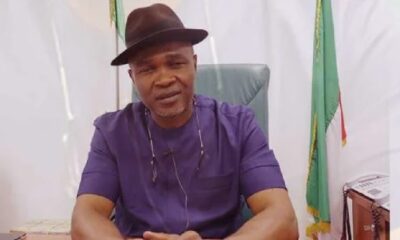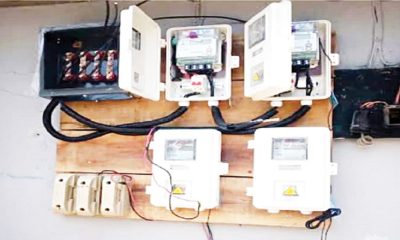News
FG Moves To Disconnect 50 Million Unlinked SIMs Next Month

While the insecurity situation in some parts of the country has festered in the last seven years and has led to increased banditry, terrorism and frauds across boards, the Federal Government will from September 15, 2024 block all Subscriber Identification Modules (SIMs) not linked to National Identity Numbers, NIN.
The FG made this announcement through the Nigerian Communications Commission (NCC) yesterday in a statement, where it informed that it has pegged the final deadline date for the linkage of SIMs to NINs to September 14.
This final deadline date is coming amid a rise in the activities of criminals, who still use SIMs, and NINs to perpetrate their criminal activities. The SIM-NIN linkage exercise ab initio, according to the government was to help in addressing criminality, including kidnappers, bandits, and fraudsters, among others. But the extent of success cannot be ascertained.
Indeed, NCC in the statement signed by the Director of Public Affairs, Reuben Mouka, to announce the deadline, said Nigeria has made significant progress in the Federal Government’s 2020 policy to link all SIMs to NINs.
The telecoms regulator disclosed that to date, over 153 million SIMs have been successfully linked to a NIN, reflecting an impressive compliance rate of 96 per cent, a substantial increase from 69.7 per cent in January 2024.
Though the NCC claimed that there has been 96 per cent complaint for the linkage, The Guardian checks showed that over 50 million SIMs may be blocked by September if not linked, especially because of the multi-SIMMING nature of Nigerians and use of different devices that are SIM dependent.
As of Q1, 2024, the NCC puts active mobile subscriptions in the country at 219 million and in the statement of yesterday, about 153 million SIMs have been linked, meaning that some 50 million risk disconnection by mid-September. It must also be stated that between the second quarter and now, some lines must have been registered and linked, which would make the exposed SIMs hover between 50 million and 55 million.
It should be noted that under the NIN-SIM linkage policy, an individual is allowed to register a maximum of four SIM cards per network operator. This is exclusive of SIMS that the individual may wish to use in Internet of Things (IoT) devices such as wearable, trackers, among others.
NCC said as the country approaches the final phase of this critical process, it seeks the continued cooperation of all Nigerians to achieve 100 per cent compliance.
The telecoms regulator said the complete linkage of all SIM cards to NINs is essential for enhancing the trust and security of the digital economy.
“By verifying all mobile users, this policy strengthens confidence in digital transactions, reduces the risk of fraud and cybercrime, and supports greater participation in e-commerce, digital banking, and mobile money services. This, in turn, promotes financial inclusion and drives economic growth,” it stated.
NCC revealed that through collaboration with the Office of the National Security Adviser (ONSA) and the National Identity Management Commission (NIMC), it uncovered alarming cases where individuals possessed an unusually high number of SIM cards—some exceeding 100,000.
The Commission said it remained committed to working with se
NewsFG Moves To Disconnect 50 Million Unlinked SIMs Next Month
ByVreportersPublished on August 29, 2024
While the insecurity situation in some parts 3the country has festered in the last seven years and has led to increased banditry, terrorism and frauds across boards, the Federal Government will from September 15, 2024 block all Subscriber Identification Modules (SIMs) not linked to National Identity Numbers, NIN.
The FG made this announcement through the Nigerian Communications Commission (NCC) yesterday in a statement, where it informed that it has pegged the final deadline date for the linkage of SIMs to NINs to September 14.
This final deadline date is coming amid a rise in the activities of criminals, who still use SIMs, and NINs to perpetrate their criminal activities. The SIM-NIN linkage exercise ab initio, according to the government was to help in addressing criminality, including kidnappers, bandits, and fraudsters, among others. But the extent of success cannot be ascertained.
Indeed, NCC in the statement signed by the Director of Public Affairs, Reuben Mouka, to announce the deadline, said Nigeria has made significant progress in the Federal Government’s 2020 policy to link all SIMs to NINs.
The telecoms regulator disclosed that to date, over 153 million SIMs have been successfully linked to a NIN, reflecting an impressive compliance rate of 96 per cent, a substantial increase from 69.7 per cent in January 2024.
Though the NCC claimed that there has been 96 per cent complaint for the linkage, The Guardian checks showed that over 50 million SIMs may be blocked by September if not linked, especially because of the multi-SIMMING nature of Nigerians and use of different devices that are SIM dependent.
As of Q1, 2024, the NCC puts active mobile subscriptions in the country at 219 million and in the statement of yesterday, about 153 million SIMs have been linked, meaning that some 50 million risk disconnection by mid-September. It must also be stated that between the second quarter and now, some lines must have been registered and linked, which would make the exposed SIMs hover between 50 million and 55 million.
It should be noted that under the NIN-SIM linkage policy, an individual is allowed to register a maximum of four SIM cards per network operator. This is exclusive of SIMS that the individual may wish to use in Internet of Things (IoT) devices such as wearable, trackers, among others.
NCC said as the country approaches the final phase of this critical process, it seeks the continued cooperation of all Nigerians to achieve 100 per cent compliance.
The telecoms regulator said the complete linkage of all SIM cards to NINs is essential for enhancing the trust and security of the digital economy.
“By verifying all mobile users, this policy strengthens confidence in digital transactions, reduces the risk of fraud and cybercrime, and supports greater participation in e-commerce, digital banking, and mobile money services. This, in turn, promotes financial inclusion and drives economic growth,” it stated.
NCC revealed that through collaboration with the Office of the National Security Adviser (ONSA) and the National Identity Management Commission (NIMC), it uncovered alarming cases where individuals possessed an unusually high number of SIM cards—some exceeding 100,000.
The Commission said it remained committed to working with security agencies and other stakeholders to crack down on the sale of pre-registered SIMs, thereby safeguarding national security and ensuring the integrity of mobile numbers in Nigeria.
“To ensure full compliance with the NIN-SIM linkage policy, the NCC has directed all Mobile Network Operators (MNOs) to complete the mandatory verification and linkage of SIMs to NINs by September 14, 2024.
“Effective September 15, 2024, the Commission expects that no SIM operating in Nigeria will be without a valid NIN,” it stated. NCC urged all members of the public, who have not yet completed their NIN-SIM linkage, or who have faced issues due to verification mismatches, to visit their service providers promptly to update their details before the deadline. Alternatively, the approved self-service portals are available for this purpose.
The Commission also reminded the public that the sale and purchase of pre-registered SIMs are criminal offences punishable by imprisonment and fines.
“We encourage citizens to report any such activities to the Commission via our toll-free line (622) or through our social media platforms,” it stated.
Indeed, the acclaimed success of the NIN-SIM linkage has been questioned as regards the extent to which the initiative has helped the country to curb the rising menace of kidnapping, banditry, cyber fraud and the rest in the country.
It is worrisome that despite the sacrifices made by Nigerians to get their SIM registered and linked to NIN, crime levels refused to abate in the country.
At the commencement of the linkage exercise in 2020, the then Minister of Communications and Digital Economy, Prof. Isah Pantami, claimed that the process would enable Nigeria to tackle the growing insecurity in the country, but four years after, insecurity has festered.
Bandits have become more emboldened, kidnapping harmless Nigerians at every slightest opportunity, subsequently smiling to banks after every successful operation without traces, despite the NIN-SIM initiatives.
According to checks, from January and July 2024, no fewer than 2,140 people were kidnapped. An SBM Intelligence report on Nigeria’s security crisis reveals alarming statistics for 2024, showing, 3,277 people kidnapped in 135 mass abduction incidents, resulting in 125 deaths. The North West and North Central regions were hardest hit, with 2,719 kidnappings combined.
It also showed that families of 62 victims, representing 2.89 per cent of the total abductees, paid the sum of N389 million as ransom to secure their release from the kidnappers.
Over the seven months, gunmen reportedly kidnapped 193 people in January, 101 in February, 543 in March, 112 in April, 977 in May, 97 in June, and 117 in July, totaling 2,140.
Guardian
News
Just in: Shettima jets out to attend Senegal’s independence

Vice President Kashim Shettima has departed Abuja for Dakar, Senegal for official assignment.
The VP is expected to represent President Bola Ahmed Tinubu at the West African nation’s 65th Independence Anniversary celebrations.
Senegal marks its Independence Day on April 4 each year, commemorating its liberation from French colonial rule in 1960.
The annual celebration is a significant event featuring national parades, cultural displays, and ceremonies highlighting the country’s achievements and unity.
A statement issued on Thursday by Senior Special Assistant to the President on Media and Communications, Office of the Vice President, Stanley Nkwocha, said Shettima’s participation followed an official invitation from Senegalese President, Bassirou Diomaye Faye.
This underscored the strong diplomatic and economic ties between Nigeria and Senegal.
The two nations share longstanding relations, particularly within the Economic Community of West African States (ECOWAS), fostering cooperation on regional security, trade, and development initiatives.
The event is expected to reaffirm Senegal’s commitment to democratic governance and regional cooperation.
Vice President Shettima is scheduled to return to Nigeria immediately after the one-day celebrations, continuing his engagements in national development and diplomatic outreach.
News
Just in: “Ignore rumour mongers, there was no time I collapsed “-Wike asserts

Federal Capital Territory FCT minister, Nyesom Wike on Thursday dismissed social media reports that he collapsed last week, describing the reports as the handiwork of rumour mongers trying to score cheap political points.
Wike spoke after he inspected four ongoing projects in the territory, including the International Conference Centre ICC.
News
CJ transfers Natasha’s case to Justice Nyako

The Chief Judge of the Federal High Court, Justice John Tsoho, has reassigned the suit filed by Senator Natasha Akpoti-Uduaghan against Senate President Godswill Akpabio and others to Justice Binta Nyako.
The case, which was initially handled by Justice Obiora Egwuatu, will now be heard afresh by Justice Nyako following Egwuatu’s withdrawal from the matter. His decision came after allegations of bias were reportedly raised by Akpabio, the third defendant in the suit.
Justice Egwuatu withdrew from the case on March 25, citing concerns over judicial integrity.
“Justice is rooted in confidence in the court. Once a litigant expresses his belief that there is bias or likelihood of bias on the part of the judge, it will not be in the interest of justice for the judge to continue,” he stated.
He forwarded the case file to the Chief Judge for reassignment.
Senator Akpoti-Uduaghan, who represents Kogi Central Senatorial District, had filed the lawsuit to halt an investigation into her alleged misconduct by the Senate Committee on Ethics, Privileges, and Public Petitions. She had sought an interim injunction to prevent the committee from proceeding with disciplinary actions against her.
Justice Egwuatu previously issued an order on March 4 declaring Akpoti-Uduaghan’s suspension by the Senate null and void. However, on March 19, he set aside a portion of his ruling after hearing arguments from both sides. The Senate had filed a motion urging the court to vacate the order, arguing that it interfered with its legislative duties and could lead to a constitutional crisis.
During legal proceedings, the Senate’s lawyer, Chikaosolu Ojukwu, argued that the court’s order restrained the Senate from fulfilling its constitutional responsibilities, while Akpoti-Uduaghan’s counsel, Michael Numa, opposed the motion, describing it as a disregard for the court’s authority. He urged the court to dismiss the Senate’s application and take disciplinary action against the defendants for contempt.
Akpoti-Uduaghan also filed a contempt charge, asserting that her suspension was a deliberate violation of the court’s interim injunction. She maintained that the court’s directive was duly served on the defendants, but they proceeded with actions in defiance of the ruling.
Nigeria’s 1999 Constitution (as amended) grants the National Assembly the authority to manage its internal affairs, including disciplining its members. However, this power is not unlimited. It must be exercised in accordance with constitutional provisions, due process, and the rule of law.
The principle of separation of powers, outlined in Section 4 for the legislature, Section 6 for the judiciary, and Section 5 for the executive, ensures that each arm of government functions independently without interference. However, courts have the authority to review legislative actions if they infringe on fundamental rights or violate existing laws.
Judicial rulings have established that while legislatures hold disciplinary authority, their actions must align with the principles of natural justice, particularly the right to a fair hearing, as outlined in Section 36 of the Constitution. The outcome of this case could clarify the extent of legislative immunity and determine whether courts can override Senate disciplinary actions when due process is at stake.
-

 News6 hours ago
News6 hours agoNatasha: Kogi PDP hammers Ododo, reiterates unfeigned support for her
-

 News13 hours ago
News13 hours agoRivers APC demands Fubara’s probe over ex-HoS allegations
-

 Economy5 hours ago
Economy5 hours agoSEE Black Market Dollar To Naira Exchange Rate Today 3rd April 2025
-

 News4 hours ago
News4 hours agoJust in: INEC dumps recall petition against Sen Natasha
-

 Economy14 hours ago
Economy14 hours agoNaira rebounces against the dollar in parallel market
-

 News6 hours ago
News6 hours agoUS cancels ex- president ,Nobel Peace Prize winner Oscar Arias visa
-

 News1 hour ago
News1 hour agoJust in: “Ignore rumour mongers, there was no time I collapsed “-Wike asserts
-

 News9 hours ago
News9 hours agoJust in: Finally, Trump imposes 14% tarriff on Nigeria oil, others

















